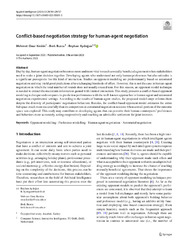Conflict-based negotiation strategy for human-agent negotiation
| dc.contributor.author | Keskin, Mehmet Onur | |
| dc.contributor.author | Buzcu, Berk | |
| dc.contributor.author | Aydoğan, Reyhan | |
| dc.date.accessioned | 2024-01-11T10:16:39Z | |
| dc.date.available | 2024-01-11T10:16:39Z | |
| dc.date.issued | 2023-12 | |
| dc.identifier.issn | 0924-669X | en_US |
| dc.identifier.uri | http://hdl.handle.net/10679/9034 | |
| dc.identifier.uri | https://link.springer.com/article/10.1007/s10489-023-05001-9 | |
| dc.description.abstract | Day by day, human-agent negotiation becomes more and more vital to reach a socially beneficial agreement when stakeholders need to make a joint decision together. Developing agents who understand not only human preferences but also attitudes is a significant prerequisite for this kind of interaction. Studies on opponent modeling are predominantly based on automated negotiation and may yield good predictions after exchanging hundreds of offers. However, this is not the case in human-agent negotiation in which the total number of rounds does not usually exceed tens. For this reason, an opponent model technique is needed to extract the maximum information gained with limited interaction. This study presents a conflict-based opponent modeling technique and compares its prediction performance with the well-known approaches in human-agent and automated negotiation experimental settings. According to the results of human-agent studies, the proposed model outpr erforms them despite the diversity of participants’ negotiation behaviors. Besides, the conflict-based opponent model estimates the entire bid space much more successfully than its competitors in automated negotiation sessions when a small portion of the outcome space was explored. This study may contribute to developing agents that can perceive their human counterparts’ preferences and behaviors more accurately, acting cooperatively and reaching an admissible settlement for joint interests. | en_US |
| dc.description.sponsorship | CHIST-ERA ; TÜBİTAK | |
| dc.language.iso | eng | en_US |
| dc.publisher | Springer | en_US |
| dc.relation.ispartof | Applied Intelligence | |
| dc.rights | Attribution 4.0 International | |
| dc.rights | openAccess | |
| dc.rights.uri | https://creativecommons.org/licenses/by/4.0/ | |
| dc.title | Conflict-based negotiation strategy for human-agent negotiation | en_US |
| dc.type | Article | en_US |
| dc.description.version | Publisher version | en_US |
| dc.peerreviewed | yes | en_US |
| dc.publicationstatus | Published | en_US |
| dc.contributor.department | Özyeğin University | |
| dc.contributor.authorID | (ORCID 0000-0002-5260-9999 & YÖK ID 145578) Aydoğan, Reyhan | |
| dc.contributor.ozuauthor | Aydoğan, Reyhan | |
| dc.identifier.volume | 53 | en_US |
| dc.identifier.issue | 24 | en_US |
| dc.identifier.startpage | 29741 | en_US |
| dc.identifier.endpage | 29757 | en_US |
| dc.identifier.wos | WOS:001097012500001 | |
| dc.identifier.doi | 10.1007/s10489-023-05001-9 | en_US |
| dc.subject.keywords | Automated negotiation | en_US |
| dc.subject.keywords | Human-agent negotiation | en_US |
| dc.subject.keywords | Opponent modelling | en_US |
| dc.subject.keywords | Preference modelling | en_US |
| dc.identifier.scopus | SCOPUS:2-s2.0-85175627196 | |
| dc.contributor.ozugradstudent | Keskin, Mehmet Onur | |
| dc.contributor.ozugradstudent | Buzcu, Berk | |
| dc.relation.publicationcategory | Article - International Refereed Journal - Institutional Academic Staff |
Files in this item
This item appears in the following Collection(s)
Share this page




